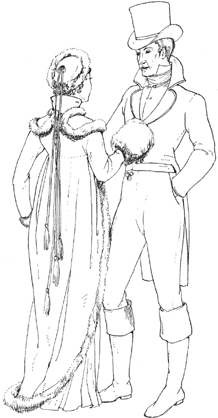Mrs. Bennet said only, “Nonsense, nonsense!”
“What can be the meaning of that emphatic exclamation?” cried he. “Do you consider the forms of introduction, and the stress that is laid on them, as nonsense? I cannot quite agree with you there.9 What say you, Mary? for you are a young lady of deep reflection I know, and read great10 books, and make extracts.”11
Mary wished to say something very sensible, but knew not how.12
“While Mary is adjusting her ideas,”13 he continued, “let us return to Mr. Bingley.”
“I am sick of Mr. Bingley,” cried his wife.
“I am sorry to hear that; but why did not you tell me so before? If I had known as much this morning, I certainly would not have called on him. It is very unlucky; but as I have actually paid the visit, we cannot escape the acquaintance now.”
The astonishment of the ladies was just what he wished; that of Mrs. Bennet perhaps surpassing the rest; though when the first tumult of joy was over, she began to declare that it was what she had expected all the while.
“How good it was in you, my dear Mr. Bennet! But I knew I should persuade you at last. I was sure you loved your girls too well to neglect such an acquaintance. Well, how pleased I am! and it is such a good joke, too, that you should have gone this morning, and never said a word about it till now.”
“Now, Kitty, you may cough as much as you chuse,” said Mr. Bennet; and, as he spoke, he left the room, fatigued with the raptures of his wife.
“What an excellent father you have, girls,” said she, when the door was shut. “I do not know how you will ever make him amends for his kindness; or me either, for that matter. At our time of life, it is not so pleasant I can tell you, to be making new acquaintance every day; but for your sakes, we would do any thing. Lydia, my love, though you are the youngest, I dare say Mr. Bingley will dance with you at the next ball.”
“Oh!” said Lydia stoutly, “I am not afraid; for though I am the youngest, I'm the tallest.”14
The rest of the evening was spent in conjecturing how soon he would return Mr. Bennet's visit, and determining when they should ask him to dinner.15

Fashions of the period. See also p. IS, note 3. [From Iris Brooke, Western European Costume, Seventeenth to Mid-Nineteenth Century (New York, 1940), p. 131]
1. waited on: called upon.
2. trimming a hat: decorating a hat, usually by attaching ribbons or feathers or other items to it. Adding decorations to hats, as well as to other articles of dress, was a common practice at the time. Sometimes the trimmings or decorations could cost more than the hat. Jane Austen refers, with evident pleasure, to trimming a hat on numerous occasions in her letters; in one she wonders about, and asks her sister's opinion on, whether flowers or fruit would look better on a hat, making sure to mention that the flowers would cost less (June n, 1799).
3. assemblies: general social gatherings with dancing and other amusements. They had become popular during the eighteenth century, and by the time of the novel almost every town, except for the very smallest, had assembly rooms built for the specific purpose of accommodating them. Assemblies were generally public, i.e., open to whichever families or individuals could afford to buy tickets or subscriptions.
4. I have no opinion of her: I have no good opinion of her. Mrs. Bennet fears that Mrs. Long will not introduce them in order to preserve Mr. Bing-ley for her nieces. This competitive suspicion of Mrs. Bennet, revealed also in her fears about Lady Lucas visiting Mr.
1 comment